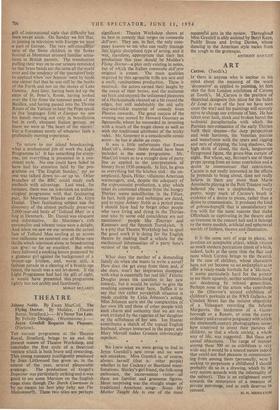THEATRE
THE current programme at the Theatre Royal, Stratford, brings to an end the present season of Theatre Workshop, and concludes the first cycle of a theatrical venture which is both brave and rewarding. This young company intelligently produced by Joan Littlewood has given us, in the course of the year, several pleasurable significant: Theatre Workshop shows at its best in comedy that verges on commedia dell'arte. They a7, in fact, the only com- pany known to me who can really manage this highly disciplined type of acting, and it was, therefore, appropriate that their last production this year should be Moliere's Flying Doctor—a play only existing in notes, but of which the Italian commedia dell'arte original is extant. The main qualities required by this agreeable trifle are zest and a swift, rumbustious production. These it received: the actors earned their laughs by the sweat of their brows, and the audience sat back and enjoyed the unlicensed pleasures of a Harlequinade cleaned up a bit round the edges, but still indubitably the old salty slap-and-tickle material of comedy from Plautus onwards. The great success of the evening was scored by Howard Goorney as Sganarelle, whom he succeeded in investing with a touch of the tragic clown as well as with the traditional attributes of the tricky valet. Mr. Goorney is a considerable comic actor—he has le diable au corps.
It was a little unfortunate that Ewan MacColl's Johnny Noble should have been included in the same programme. Mr. MacColl treats us to a straight dose of party line as applied to the interpretation of history frcm 1930 onwards. In fact, he gives us everything but the kitchen sink : the un- employed, Spain, Hitler, villainous American warmongers, and, despite the adequacy of the expressionist production, a play which takes its emotional climate from the hungry Thirties seems antediluvian in the Fifties. In fact, both play and technique are dated, and to enjoy Johnny Noble as a period piece I should have had to forget other people who were living and dying in the Thirties and who by some odd coincidence are not mentioned: people like Zinoviev and Kamenev and the Spanish Trotskyists. It is a pity that Theatre Workshop has to spoil the' good work it is doing for the English theatre by making itself a vehicle for the mechanical inhumanities Of a party boss's version of the truth.
What does the mother of a demanding family do when she wants to write a novel? How does she get away from them and, if she does, won't her inspiration disappear with what is essentially her real life? Felicity Douglas poses the question in her new comedy, but it would be unfair to give the resulting answers away here. Suffice it to say that this rather novelettish situation is made credible by Celia Johnson's acting. Miss Johnson sorts out the complexities of her own life and those of other people with such charm and authority that we are not even irritated by the vagaries of her daughter or the selfishness of her son. Ian Hunter contributes a sketch of the typical English husband, always immersed in the paper and Mary Merrall makes Grannie convincingly repellent. • We knew what we were going to find in Joyce Grenfell's new revue and we were not mistaken. Miss Grenfell is, of course, always herself (that is: other people) whether in her Cockney or Bootland mani- festations. Shirley's girl friend, the folk-song enthusiast, the inconvenient visitor—all these are familiar and gruesome figures. More surprising was the straight singer of traditional American songs: Songs My Mother Taught Me is one of the most successful acts in the review. Throughout Miss Grenfell is ably assisted by Beryl Kaye, Paddy Stone and Irving Davies, whose dancing in the American style varies from the tough to the grotesque.
ANTHONY HARTLEY,'


































 Previous page
Previous page